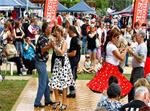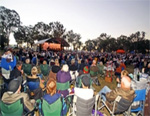What Rules? - Local Government Land Use Decision-Making for Events in NSW
What Rules? - Local Government Land Use Decision-Making for Events in NSW
Submitted by Garry O'Dell on 6th August 2014
Local events such as markets, community gatherings, and sporting, music, art, trade and agricultural festivals provide significant environmental, economic and social benefits to communities. In 2012 the NSW Government Visitor Economy Taskforce report highlighted the importance of such events to the State economy.
Events provide positive experiences for tourists, visitors and local residents. The installation of temporary facilities such as stages, car parks, amenities and food kiosks also make any space usable for an event, including vacant private/public spaces, rural/urban land, and even water and the air. The desire amongst participants for new and scenic backdrops combined with the improved mobility and cost effectiveness of temporary structures has provided new opportunities for event locations once thought unfeasible. However, despite new event opportunities and benefits for communities, there is a marked lack of consistency in the rules and processes applied in assessing events by local authorities.
 Preliminary research has revealed anecdotal evidence that state and local government, community, and industry stakeholders have different interpretations, priorities and understandings as to the assessment of events, for example with regards to the locations, themes, participants, promoters' credentials, or environmental issues.
Preliminary research has revealed anecdotal evidence that state and local government, community, and industry stakeholders have different interpretations, priorities and understandings as to the assessment of events, for example with regards to the locations, themes, participants, promoters' credentials, or environmental issues.
Do local councillors want to be harassed by the local Rotary Club when a DA is required for their fund raiser, or even the local church group for singing Christmas carols!
 There is uncertainty about how events should be defined, conflicting organisational priorities and community expectations, and a lack of useful assessment practices and methodologies. Furthermore, it appears that event assessors, be they a parks manager, tourism officer, or town planner, receive limited direction on how to deal with event applications. For a town planner, the uncertainty of the decision making process is further complicated by practices, rules and regulations relating to the assessment of permanent developments such as residential estates, shopping centres and business parks. Events are difficult to fit into the land use planning regulatory process and, as a result, are inconsistently assessed.
There is uncertainty about how events should be defined, conflicting organisational priorities and community expectations, and a lack of useful assessment practices and methodologies. Furthermore, it appears that event assessors, be they a parks manager, tourism officer, or town planner, receive limited direction on how to deal with event applications. For a town planner, the uncertainty of the decision making process is further complicated by practices, rules and regulations relating to the assessment of permanent developments such as residential estates, shopping centres and business parks. Events are difficult to fit into the land use planning regulatory process and, as a result, are inconsistently assessed.
I am engaging in doctoral research that explores the decision making processes undertaken by local government for events. To inform this research and to develop a detailed picture of current processes, I am hoping to collect information directly from councils regarding their practices regarding events. In particular, I am seeking the following information:
- How does the events assessment process operate in your local council?
- What policies and practices does your local council use to regulate events?
- Who is responsible for the regulation of events in your local council?
I am particularly interested in exploring the following characteristics/dynamics:
- Land-, water- or air-based use/event
- Held on private or public spaces
- One-off, intermittent or a regular use/event
- Arranged with a commercial or not-for-profit focus
- Using temporary facilities such as marques, stages, car parks, amenities and food kiosks to make any public or private space usable
- On or in a space (building, land, water or air) not primarily intended for the use/event
- At the end of the temporary use/event the space is restored, as far as is practicable, to the pre-use condition
- Does not hinder the permanent development of the space
- Can be a mix of temporary uses, e.g. camping with a concert.
If you or anyone within your council is able to provide some insight into your events decision making processes, particularly with regards to the abovementioned characteristics/dynamics, please contact [email protected] or leave your comments in the space below.
 From 1981 Garry O’Dell has worked in NSW local government assessing development proposals and strategic land use planning projects. In 1994 he became a Director/part owner of a multi-disciplinary land-use consultancy. In 2012, during his involvement with the Hunter Wine Country Tourism Board, Garry worked with Associate Professor Kevin Lyons from the University of Newcastle. This resulted in the current doctoral research project at the University of Newcastle.
From 1981 Garry O’Dell has worked in NSW local government assessing development proposals and strategic land use planning projects. In 1994 he became a Director/part owner of a multi-disciplinary land-use consultancy. In 2012, during his involvement with the Hunter Wine Country Tourism Board, Garry worked with Associate Professor Kevin Lyons from the University of Newcastle. This resulted in the current doctoral research project at the University of Newcastle.
Back to the Town Crier
Cover image courtesy of the City of Sydney.



- Garry.ODell's blog
- Log in or register to post comments
- 522 reads
Submitted by Garry O'Dell on 6th August 2014
Local events such as markets, community gatherings, and sporting, music, art, trade and agricultural festivals provide significant environmental, economic and social benefits to communities. In 2012 the NSW Government Visitor Economy Taskforce report highlighted the importance of such events to the State economy.
Events provide positive experiences for tourists, visitors and local residents. The installation of temporary facilities such as stages, car parks, amenities and food kiosks also make any space usable for an event, including vacant private/public spaces, rural/urban land, and even water and the air. The desire amongst participants for new and scenic backdrops combined with the improved mobility and cost effectiveness of temporary structures has provided new opportunities for event locations once thought unfeasible. However, despite new event opportunities and benefits for communities, there is a marked lack of consistency in the rules and processes applied in assessing events by local authorities.
 Preliminary research has revealed anecdotal evidence that state and local government, community, and industry stakeholders have different interpretations, priorities and understandings as to the assessment of events, for example with regards to the locations, themes, participants, promoters' credentials, or environmental issues.
Preliminary research has revealed anecdotal evidence that state and local government, community, and industry stakeholders have different interpretations, priorities and understandings as to the assessment of events, for example with regards to the locations, themes, participants, promoters' credentials, or environmental issues.
Do local councillors want to be harassed by the local Rotary Club when a DA is required for their fund raiser, or even the local church group for singing Christmas carols!
 There is uncertainty about how events should be defined, conflicting organisational priorities and community expectations, and a lack of useful assessment practices and methodologies. Furthermore, it appears that event assessors, be they a parks manager, tourism officer, or town planner, receive limited direction on how to deal with event applications. For a town planner, the uncertainty of the decision making process is further complicated by practices, rules and regulations relating to the assessment of permanent developments such as residential estates, shopping centres and business parks. Events are difficult to fit into the land use planning regulatory process and, as a result, are inconsistently assessed.
There is uncertainty about how events should be defined, conflicting organisational priorities and community expectations, and a lack of useful assessment practices and methodologies. Furthermore, it appears that event assessors, be they a parks manager, tourism officer, or town planner, receive limited direction on how to deal with event applications. For a town planner, the uncertainty of the decision making process is further complicated by practices, rules and regulations relating to the assessment of permanent developments such as residential estates, shopping centres and business parks. Events are difficult to fit into the land use planning regulatory process and, as a result, are inconsistently assessed.
I am engaging in doctoral research that explores the decision making processes undertaken by local government for events. To inform this research and to develop a detailed picture of current processes, I am hoping to collect information directly from councils regarding their practices regarding events. In particular, I am seeking the following information:
- How does the events assessment process operate in your local council?
- What policies and practices does your local council use to regulate events?
- Who is responsible for the regulation of events in your local council?
I am particularly interested in exploring the following characteristics/dynamics:
- Land-, water- or air-based use/event
- Held on private or public spaces
- One-off, intermittent or a regular use/event
- Arranged with a commercial or not-for-profit focus
- Using temporary facilities such as marques, stages, car parks, amenities and food kiosks to make any public or private space usable
- On or in a space (building, land, water or air) not primarily intended for the use/event
- At the end of the temporary use/event the space is restored, as far as is practicable, to the pre-use condition
- Does not hinder the permanent development of the space
- Can be a mix of temporary uses, e.g. camping with a concert.
If you or anyone within your council is able to provide some insight into your events decision making processes, particularly with regards to the abovementioned characteristics/dynamics, please contact [email protected] or leave your comments in the space below.
 From 1981 Garry O’Dell has worked in NSW local government assessing development proposals and strategic land use planning projects. In 1994 he became a Director/part owner of a multi-disciplinary land-use consultancy. In 2012, during his involvement with the Hunter Wine Country Tourism Board, Garry worked with Associate Professor Kevin Lyons from the University of Newcastle. This resulted in the current doctoral research project at the University of Newcastle. From 1981 Garry O’Dell has worked in NSW local government assessing development proposals and strategic land use planning projects. In 1994 he became a Director/part owner of a multi-disciplinary land-use consultancy. In 2012, during his involvement with the Hunter Wine Country Tourism Board, Garry worked with Associate Professor Kevin Lyons from the University of Newcastle. This resulted in the current doctoral research project at the University of Newcastle. |
Back to the Town Crier
Cover image courtesy of the City of Sydney.










